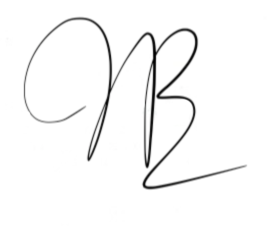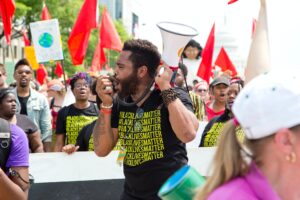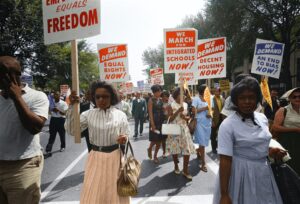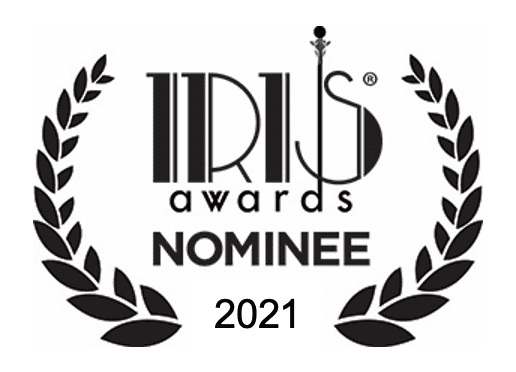— September 30, 2020 —
I knew in advance of the interview that the question would be asked, but it still startled me when it was. Few Black fathers have a ready-made answer to: “When will you speak to your child about race? And what will you tell her?”
This question came about in February, three months before the police killing of George Floyd, as part of a project I participated in exploring Black fatherhood. In the months since, it has echoed in my mind as the Black Lives Matter movement has commanded global attention and my daughter hits a new milestone: her sixth birthday.
With each passing birthday, my daughter moves closer to the age I was when my mother sat me down to have The Talk, that unfortunately necessary conversation — the first of many — that Black parents often have with their children about race, racism and how to navigate a society that does not always see you as fully human. That this is a familiar rite of passage in Black families speaks volumes about the systemic and generational dehumanization that African Americans endure.
The Talk defined and in practice
The Talk covers all manner of indignities and scenarios: the first time you were called the n-word; what to do when you’re pulled over by police; how to respond to being followed by a store employee who suspects you’re a shoplifter because of your race. The list goes on.
In my case, nothing particularly dramatic had happened. My mother must have sensed it was time for me, at the age of 8, to be introduced to the concept of racial difference given the two worlds I inhabited in 1983 as a third-grader: the predominantly Black neighborhood of South-Central Los Angeles where I lived and the then predominantly white suburb of Northridge in the San Fernando Valley, where my elementary school was located.
During the week, I’d ride a school bus 40 minutes from South-Central to the Valley in pursuit of a better education. My mother decided to have me bused under a voluntary Los Angeles Unified School District program to integrate schools. The program, which effectively dismantled mandatory busing, allowed minority parents the option of busing their children to predominantly white schools. My mother seized the opportunity. At its peak in 1984, about 23,000 students were bused under the voluntary program. I was one of them.
By introducing me to a racialized view of the world grounded in a history of striving and resistance, my mother inoculated me with a sense of pride against the virulent nature of racist beliefs and actions.
My mother, born and partly raised in the city of Greenville in segregated 1960s Mississippi, later told me she believed the educational opportunities in the Valley superior. She also wanted me to gain exposure to people of different cultures.
But she also apparently wanted to be sure I was grounded in my own.
I recall my mother sitting down with me in our apartment and explaining that the shades of skin tone among the people in our neighborhood — brown sugar, coconut, honey iced tea, golden yellow — reflected the diversity of those who identified as Black, our racial-ethnic group.
“You’re Black,” my mother said, as if preparing me to understand how other people might first see me.
“No, I’m yellow,” I countered, using the word my family often used to describe my fair skin tone. She laughed.
How mother’s words changed my life
My mother, a librarian at the time, explained in her version of The Talk that Black people have a rich history and culture, but are often discriminated against because they are different. As a result, they have been engaged in a long struggle for equality embodied by the civil rights leader Martin Luther King Jr. (I knew who King was. As a second-grader, I was awarded the Dr. Martin Luther King Jr. Award for “contributing to the spirit and the dream of a better world for all people.” I can’t recall what I did to earn this award, but vaguely remember drawing a crayon portrait of King and writing a short statement about his life.)
And then, with a deep sense of reverence, she described the Civil Rights Movement — what Black people were fighting for (equal treatment and opportunity) and against (discrimination and violence) and how King had a dream we would one day live in a nation where people would “not be judged by the color of their skin but by the content of their character.”
I’d never heard my mother speak before with such passion. Her words made me feel both proud and angry.
Proud to be Black. Not less than. Not ashamed. Proud.
But angry at the unfairness of it all.
Both feelings are rooted in the knowledge of one’s own history, which may explain why years later in college one of my majors was history and I became a student activist.
You don’t realize the implications of how your parents raised you until you become a parent yourself. By introducing me to a racialized view of the world grounded in a history of striving and resistance, my mother inoculated me with a sense of pride against the virulent nature of racist beliefs and actions that I had yet to encounter. She helped keep my self-esteem intact.
So, the next time I’m asked when will I speak to my child about race and what will I tell her, I will follow my mother’s example.
I will speak to my daughter when I feel she’s ready to bear the burden of racial awareness.
I will tell her, “We’re all different in our own ways, but equal: equal in rights and equally deserving of respect and kindness.”
I will tell her about the history of her people and the stories of individuals within our family who overcame adversity to not just survive, but thrive.
But most of all, I will imbue her with a sense of hope that one day The Talk will no longer be necessary.
Father on,

— Banner image photo by Jurien Huggins on Unsplash
— This article first appeared on City Dads Group.
1135 words




Leave a Reply